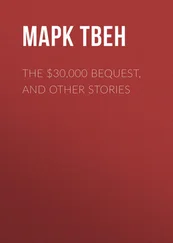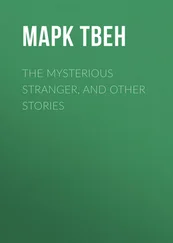Марк Твен - 30,000 Dollar Bequest and Other Stories
Здесь есть возможность читать онлайн «Марк Твен - 30,000 Dollar Bequest and Other Stories» — ознакомительный отрывок электронной книги совершенно бесплатно, а после прочтения отрывка купить полную версию. В некоторых случаях можно слушать аудио, скачать через торрент в формате fb2 и присутствует краткое содержание. Жанр: foreign_prose, на английском языке. Описание произведения, (предисловие) а так же отзывы посетителей доступны на портале библиотеки ЛибКат.
- Название:30,000 Dollar Bequest and Other Stories
- Автор:
- Жанр:
- Год:неизвестен
- ISBN:нет данных
- Рейтинг книги:3 / 5. Голосов: 1
-
Избранное:Добавить в избранное
- Отзывы:
-
Ваша оценка:
- 60
- 1
- 2
- 3
- 4
- 5
30,000 Dollar Bequest and Other Stories: краткое содержание, описание и аннотация
Предлагаем к чтению аннотацию, описание, краткое содержание или предисловие (зависит от того, что написал сам автор книги «30,000 Dollar Bequest and Other Stories»). Если вы не нашли необходимую информацию о книге — напишите в комментариях, мы постараемся отыскать её.
30,000 Dollar Bequest and Other Stories — читать онлайн ознакомительный отрывок
Ниже представлен текст книги, разбитый по страницам. Система сохранения места последней прочитанной страницы, позволяет с удобством читать онлайн бесплатно книгу «30,000 Dollar Bequest and Other Stories», без необходимости каждый раз заново искать на чём Вы остановились. Поставьте закладку, и сможете в любой момент перейти на страницу, на которой закончили чтение.
Интервал:
Закладка:
“She thinks you will soon be well.”
“How good you are, and careful, dear Aunt Hester! None goes near herr who could carry the infection?”
“It would be a crime.”
“But you see her?”
“With a distance between – yes.”
“That is so good. Others one could not trust; but you two guardian angels – steel is not so true as you. Others would be unfaithful; and many would deceive, and lie.”
Hester’s eyes fell, and her poor old lips trembled.
“Let me kiss you for her, Aunt Hester; and when I am gone, and the danger is past, place the kiss upon her dear lips some day, and say her mother sent it, and all her mother’s broken heart is in it.”
Within the hour, Hester, raining tears upon the dead face, performed her pathetic mission.
Chapter VIII
Another day dawned, and grew, and spread its sunshine in the earth. Aunt Hannah brought comforting news to the failing mother, and a happy note, which said again, “We have but a little time to wait, darling mother, then we shall be together.”
The deep note of a bell came moaning down the wind.
“Aunt Hannah, it is tolling. Some poor soul is at rest. As I shall be soon. You will not let her forget me?”
“Oh, God knows she never will!”
“Do not you hear strange noises, Aunt Hannah? It sounds like the shuffling of many feet.”
“We hoped you would not hear it, dear. It is a little company gathering, for – for Helen’s sake, poor little prisoner. There will be music – and she loves it so. We thought you would not mind.”
“Mind? Oh no, no – oh, give her everything her dear heart can desire. How good you two are to her, and how good to me! God bless you both always!”
After a listening pause:
“How lovely! It is her organ. Is she playing it herself, do you think?” Faint and rich and inspiring the chords floating to her ears on the still air. “Yes, it is her touch, dear heart, I recognize it. They are singing. Why – it is a hymn! and the sacredest of all, the most touching, the most consoling…. It seems to open the gates of paradise to me…. If I could die now….”
Faint and far the words rose out of the stillness:
Nearer, my God, to Thee,
Nearer to Thee,
E’en though it be a cross
That raiseth me.
With the closing of the hymn another soul passed to its rest, and they that had been one in life were not sundered in death. The sisters, mourning and rejoicing, said:
“How blessed it was that she never knew!”
Chapter IX
At midnight they sat together, grieving, and the angel of the Lord appeared in the midst transfigured with a radiance not of earth; and speaking, said:
“For liars a place is appointed. There they burn in the fires of hell from everlasting unto everlasting. Repent!”
The bereaved fell upon their knees before him and clasped their hands and bowed their gray heads, adoring. But their tongues clove to the roof of their mouths, and they were dumb.
“Speak! that I may bear the message to the chancery of heaven and bring again the decree from which there is no appeal.”
Then they bowed their heads yet lower, and one said:
“Our sin is great, and we suffer shame; but only perfect and final repentance can make us whole; and we are poor creatures who have learned our human weakness, and we know that if we were in those hard straits again our hearts would fail again, and we should sin as before. The strong could prevail, and so be saved, but we are lost.”
They lifted their heads in supplication. The angel was gone. While they marveled and wept he came again; and bending low, he whispered the decree.
Chapter X
Was it Heaven? Or Hell?
A Cure For The Blues
By courtesy of Mr. Cable I came into possession of a singular book eight or ten years ago. It is likely that mine is now the only copy in existence. Its title-page, unabbreviated, reads as follows:
“The Enemy Conquered; or, Love Triumphant. By G. Ragsdale McClintock, (1) author of ‘An Address,’ etc ., delivered at Sunflower Hill, South Carolina, and member of the Yale Law School. New Haven: published by T. H. Pease, 83 Chapel Street, 1845.”
No one can take up this book and lay it down again unread. Whoever reads one line of it is caught, is chained; he has become the contented slave of its fascinations; and he will read and read, devour and devour, and will not let it go out of his hand till it is finished to the last line, though the house be on fire over his head. And after a first reading he will not throw it aside, but will keep it by him, with his Shakespeare and his Homer, and will take it up many and many a time, when the world is dark and his spirits are low, and be straightway cheered and refreshed. Yet this work has been allowed to lie wholly neglected, unmentioned, and apparently unregretted, for nearly half a century.
The reader must not imagine that he is to find in it wisdom, brilliancy, fertility of invention, ingenuity of construction, excellence of form, purity of style, perfection of imagery, truth to nature, clearness of statement, humanly possible situations, humanly possible people, fluent narrative, connected sequence of events – or philosophy, or logic, or sense. No; the rich, deep, beguiling charm of the book lies in the total and miraculous absence from it of all these qualities – a charm which is completed and perfected by the evident fact that the author, whose naïve innocence easily and surely wins our regard, and almost our worship, does not know that they are absent, does not even suspect that they are absent. When read by the light of these helps to an understanding of the situation, the book is delicious – profoundly and satisfyingly delicious.
I call it a book because the author calls it a book, I call it a work because he calls it a work; but, in truth, it is merely a duodecimo pamphlet of thirty-one pages. It was written for fame and money, as the author very frankly – yes, and very hopefully, too, poor fellow – says in his preface. The money never came – no penny of it ever came; and how long, how pathetically long, the fame has been deferred – forty-seven years! He was young then, it would have been so much to him then; but will he care for it now?
As time is measured in America, McClintock’s epoch is antiquity. In his long-vanished day the Southern author had a passion for “eloquence”; it was his pet, his darling. He would be eloquent, or perish. And he recognized only one kind of eloquence – the lurid, the tempestuous, the volcanic. He liked words – big words, fine words, grand words, rumbling, thundering, reverberating words; with sense attaching if it could be got in without marring the sound, but not otherwise. He loved to stand up before a dazed world, and pour forth flame and smoke and lava and pumice-stone into the skies, and work his subterranean thunders, and shake himself with earthquakes, and stench himself with sulphur fumes. If he consumed his own fields and vineyards, that was a pity, yes; but he would have his eruption at any cost. Mr. McClintock’s eloquence – and he is always eloquent, his crater is always spouting – is of the pattern common to his day, but he departs from the custom of the time in one respect: his brethren allowed sense to intrude when it did not mar the sound, but he does not allow it to intrude at all. For example, consider this figure, which he used in the village “Address” referred to with such candid complacency in the title-page above quoted—“like the topmost topaz of an ancient tower.” Please read it again; contemplate it; measure it; walk around it; climb up it; try to get at an approximate realization of the size of it. Is the fellow to that to be found in literature, ancient or modern, foreign or domestic, living or dead, drunk or sober? One notices how fine and grand it sounds. We know that if it was loftily uttered, it got a noble burst of applause from the villagers; yet there isn’t a ray of sense in it, or meaning to it.
Читать дальшеИнтервал:
Закладка:
Похожие книги на «30,000 Dollar Bequest and Other Stories»
Представляем Вашему вниманию похожие книги на «30,000 Dollar Bequest and Other Stories» списком для выбора. Мы отобрали схожую по названию и смыслу литературу в надежде предоставить читателям больше вариантов отыскать новые, интересные, ещё непрочитанные произведения.
Обсуждение, отзывы о книге «30,000 Dollar Bequest and Other Stories» и просто собственные мнения читателей. Оставьте ваши комментарии, напишите, что Вы думаете о произведении, его смысле или главных героях. Укажите что конкретно понравилось, а что нет, и почему Вы так считаете.

![Марк Твен - Смешные рассказы [The Funny Stories]](/books/29189/mark-tven-smeshnye-rasskazy-the-funny-stories-thumb.webp)










